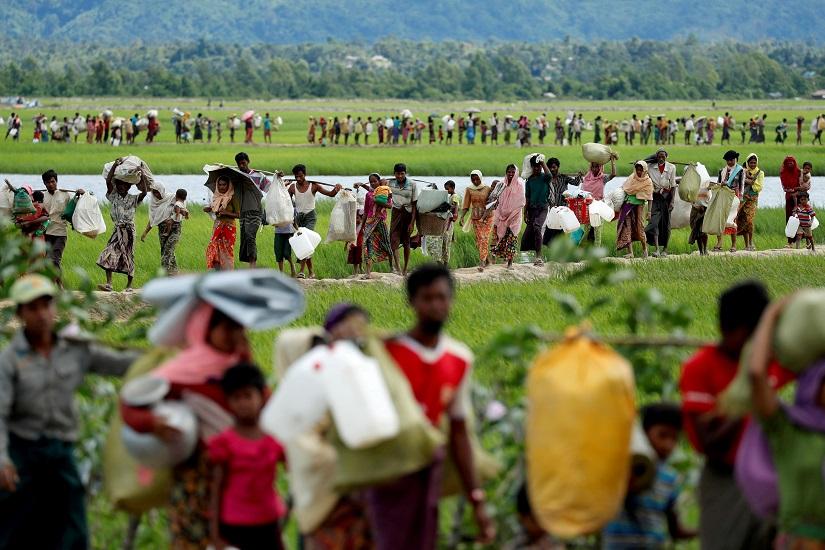 As feared, the Rohingya refugees refused to return to Myanmar, despite all arrangements made for them to go back, as finalized by two neighbouring countries.
As feared, the Rohingya refugees refused to return to Myanmar, despite all arrangements made for them to go back, as finalized by two neighbouring countries.
The second attempt in ten months to repatriate the Muslim refugees living in Bangladesh to Myanmar has fallen flat. It is understood that they would not return unless their demands were met by the Myanmar government.
Nearly two years after thousands of Rohingyas were forced to flee from Rakhine State, Myanmar enlisted 3,450 as genuine refugees for repatriation on August 22. But Most feared reprisals and refused to return. A similarly botched effort last November to ensure their return sowed confusion in the refugee camps and sparked protests.
On August 25, 2017, Myanmar security forces began an ethnic cleansing that drove an estimated one million Rohingya to neighbouring Bangladesh.
The refugees have information that an estimated 500,000 Rohingyas who remained in Rakhine State are living in appalling conditions and Myanmar security forces have confined them to camps and villages, severely restricting their freedom of movement.
For those Rohingyas confined in several hamlets, the authorities have denied freedom of movement, deprived their access to sustainable livelihoods and basic humanitarian services including adequate food, medical care, and education. These facts have raised alarm among the refugees here.
Moments after the botched attempt, Bangladesh Foreign Minister Dr AK Momen explained that the refugees eligible for repatriation declined to return to Rakhine State as they did not feel secure and safe.
Bangladesh, aspiring to attain the middle-income threshold by 2021, had been generous with a million Rohingyas – authorities felt the refugee should not be compelled to return to their villages that were not safe.
He lamented that the Myanmar government had the larger responsibility to be proactive in their political commitment to ensure voluntary, safe, and dignified repatriation of Rohingyas languishing in the world's largest refugee camps in Cox's Bazar.
The senior-most Bangladesh official in charge of foreign affairs spelt out two pressing issues, which needed immediate administrative attention.
 The first step was to develop confidence-building measures among the refugees. The Myanmar government should have invited a delegation of refugee leaders along with Bangladesh officials to visit the strife-torn Rakhine State.
The first step was to develop confidence-building measures among the refugees. The Myanmar government should have invited a delegation of refugee leaders along with Bangladesh officials to visit the strife-torn Rakhine State.
Second, Bangladesh was planning to set up an International Commission on Rohingya Refugees with members drawn from different countries, maybe also from international organizations.
However, Dr Momen was hopeful in that Myanmar had twice implemented the provisions of the memoranda of understanding (MoU) to repatriate Rohingya refugees in 1993 and 1988.
Accordingly, on 19 December 1993, an Operational Plan for mass repatriation was presented by the UNHCR, facilitating the voluntary repatriation of approximately 190,000 refugees.
From the second refugee influx, in December 1998, over 229,000 refugees had officially returned. But the story of Rohingyas was not over; the cycle of the exodus had not ended.
Aljazeera TV alleged that international media, rights groups, and United Nations were not allowed to visit Rakhine State, especially to the villages from where the Rohingyas were forced to flee in the wake of genocide.
New York-based Human Rights Watch argues that their repatriation carries possible risks exposing refugees to ethnic violence.
A United Nations-backed Fact-Finding Mission found sufficient negative information to warrant the investigation and prosecution of senior military officials for grave crimes, including genocide, in Rakhine State.
The international rights group claimed that the Myanmar regime had not made any effort to probe widespread crime against humanity against the Rohingyas.
The regime also obstructed international efforts to investigate the ethnic cleansing of Rohingya Muslims to protect their basic rights, facilitate international justice for victims, and ensure that any returns of Rohingya refugees were voluntary, safe, and dignified.
Meantime, there is no light at the end of the tunnel for the crisis as yet.
Saleem Samad, is a journalist, recipient of Ashoka Fellow (USA) and Hellman-Hammett Award, also Bangladesh correspondent of Paris based international media rights organization, Reporters Without Borders (RSF). Twitter @saleemsamad; Email: [email protected]


